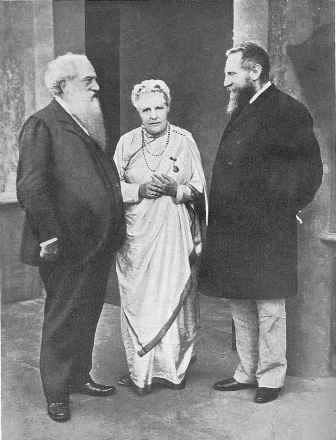"Why I became a Theosophist" is a short
pamphlet by Annie Besant, published in 1890. Besant, well-known freethinker and
member of the British National Secular Society, created a stir among her fellow
atheist-materialists when she decided to join the Theosophical Society, headed
by the controversial Madame Blavatsky. A certain Mr. Foote even penned and
distributed a 16-page pamphlet against Besant's apostasy. Besant had insisted
on remaining a member of the National Secular Society, thereby earning Foote's
ire. In her response, Besant attempts to "spin" the Theosophical
message in a direction that could be tolerable to atheists and agnostics. She
doesn't entirely succeed, and I wonder whether she really believed in it herself.
Theosophy, after all, is obviously a religious movement.
Some of Besant's arguments are pretty good, although very basic. She points out the perennial incapacity of materialism to explain, or even to make sense of, the difference between mind and matter. What we would call panpsychism explains them better - Besant uses the term "pantheism". She accepts the reality of mesmerism, clairvoyance and similar paranormal phenomena, a common enough position at the time. This makes a non-materialist explanation of the mind sound even more logical. Besant is at pains to emphasize that Theosophy doesn't believe in the personal god of traditional theism (i.e. the Biblical God also rejected by freethinkers). Rather, there is a kind of Intelligence diffused throughout the universe, of which matter is a product. She also says that everything has to be investigated before believed in, and that nothing should be taken on faith.
Besant further claims that Theosophy doesn't believe in the existence of the "supernatural". Karma is simply a kind of mental cause-and-effect, miracles are really the natural workings of unknown laws, and so on. Here, she is less persuasive, since most people would consider paranormal feats to be "supernatural", especially if some kind of unknown, non-material, intelligent forces are behind them! As for karma, that is a *moral* law, making it difficult to compare with normal cause-and-effect. Foote had asked Besant how she could be a socialist if she believed in karma, since all socialists fought against "karma". Besant's response is that everyone must attempt to improve society as a way of improving the general karmic situation (and presumably their own karma). Besant gets really in trouble when talking about the hidden "masters" somewhere in India, which supposedly instructed Blavatsky and her closest associates in the Theosophical teachings. Besant has to admit that she never met the masters, and only know about their existence at second hand. To verify the master's teachings, one most study under them (or under their chosen representatives). Proof will come later. This, of course, is similar to taking something on faith - an attitude alien to the freethinkers Besant was trying to placate.
It seems that Annie Besant got herself into some trouble when turning towards Theosophy. Judging by her pamphlet, many freethinkers (including some of her friends) rejected her or even mocked her. She was also attacked in the magazine of the Secular Society. Of course, we know what happened: Annie Wood Besant didn't give a damn, and eventually became the supreme leader of the Theosophical Society she had decided to join as a neophyte back in 1890. On a more practical note, she also became a leading activist in the Indian independence movement. But that, as they say, is another story entirely...

No comments:
Post a Comment